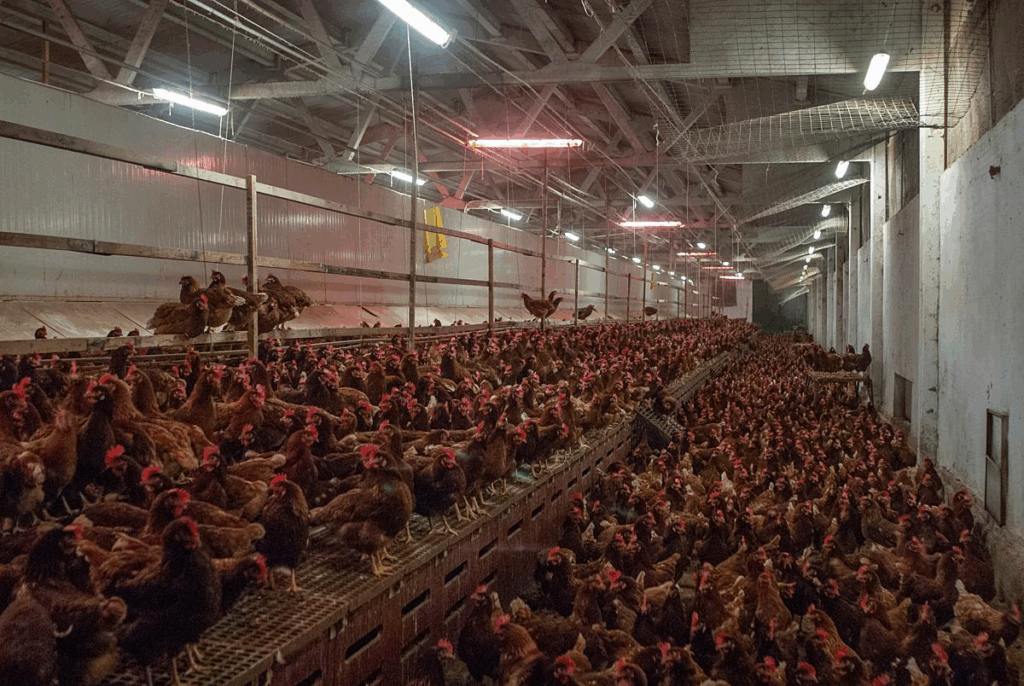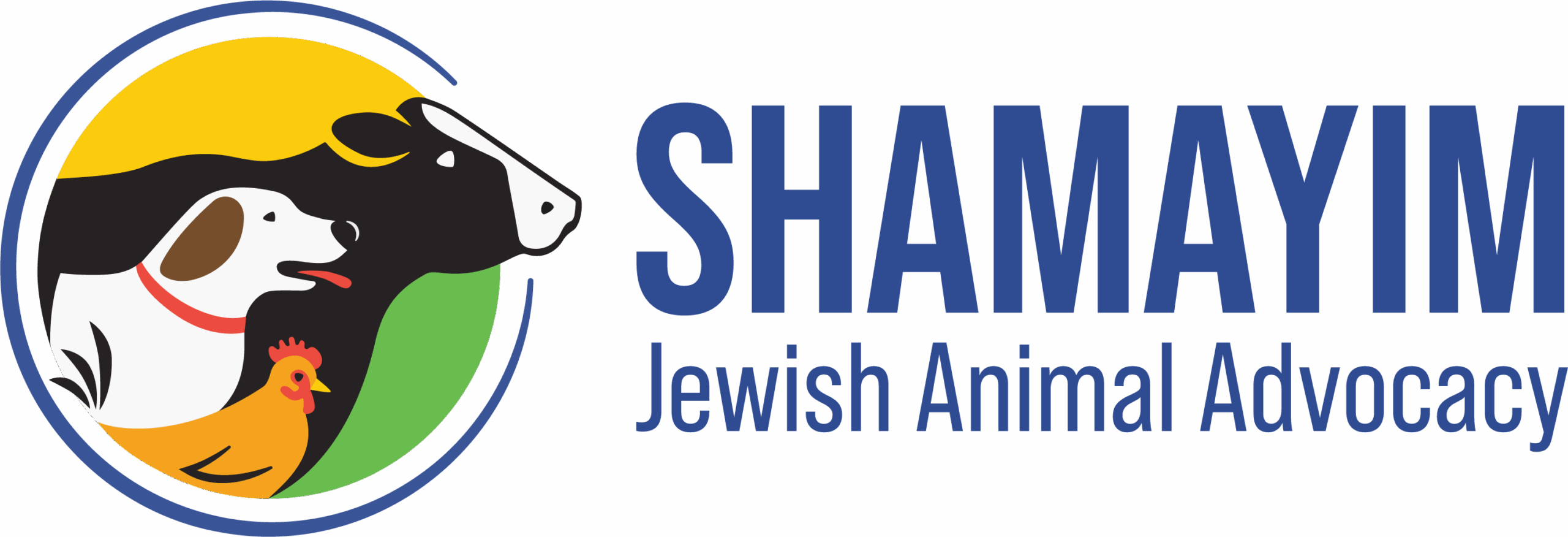Walking down the meat or dairy aisle of a grocery store, you’ll often see products with pictures of animals out on pasture, products named something along the lines of “happy cow cheese”, or claims on the labels that the animals were “cage-free”, “free-range”, or “grass-fed”. While at first glance, these labels appear to be there to improve the lives of animals, the reality is that they’re there to make people feel better about themselves and their decision to buy a product produced by a farmed animal. In this piece, I will explore the different marketing labels commonly found on products, and reveal what the reality is like for the majority of animals who are farmed across these different standards. Moreover, I will show how Judaism specifically forbids misleading and deceptive business practices, putting forward the case for Jews to distance themselves from supporting these forbidden practices by avoiding meat and dairy entirely.
Cage-free
Most of us have seen the sad images of chickens crammed into cages so small that they can’t open their wings, given less space than a sheet of A4 paper. For those who haven’t, I’ve included a photo below to help visualize what a cage, otherwise known as a “battery farm” looks like.

For the majority of human’s relationships with chickens, they were allowed and encouraged to roam outdoors, scavenging for insects and scraps of food. They were treated as the sentient beings that they are, rather than as a product to be exploited. This changed in the 1930s when battery farming first began, initially as a way to deal with an incorrect order of chickens, but soon after as a way to increase domestic production and self-reliance of eggs. Once people realized they could farm many more chickens in much less space, the inevitable increased production, mechanization, and exploitation continued. It’s important to bear in mind that chickens looked very different in the 1930s compared to the chickens of today. They were smaller, produced less meat and eggs, and lived longer.
Throughout the 20th century, chicken farming became more artificial, more controlled, more efficient, and crucially, more profitable. Most subsistence farmers, those who farm for themselves and those around them, would have between 30-100 chickens in a flock. Now, over 75% of chickens in the USA come from farms that sell more than 500,000 animals annually. This change in farming is hard to imagine for humans, and hard to live through for the chickens.
Public sentiment against caging-farmed animals has been growing over the last couple of decades, with many countries banning the use of cages on farms, and so companies have found an ingenious (or immoral, depending on how you view it) way to still mass produce and exploit chickens while simultaneously being able to claim that the chickens are cage-free – “barn raised chickens”. As seen in the image below, even if a chicken is cage-free, they are still kept in cramped indoor conditions and essentially spend their lives in one massive cage.

The unfortunate truth is that, for most people, it is simply not possible to regularly eat meat, eggs, or dairy in a way that doesn’t support mega-farms. High demand leads to high production, which leads to more exploitation and suffering for the animals.
It is not just chickens that are subjected to caged farming. Mother pigs are kept in cages so small that they can’t turn around for most of their lives. Baby veal cows are kept in small cages until they’re slaughtered. Dairy cows are tethered indoors, restricting their ability to move. When animals are treated like products, rather than as the sentient beings that they are, farmers and businesses have no problem shoving them in cages for their entire lives. However, we must advocate against the confinement of animals, and the most powerful way you can do that is by not eating animal products in the first place.
Judaism warns us against false and misleading business practices. The Torah commands the use of honest weights and measures in commerce: “You shall not falsify measures of length, weight, or capacity. You shall have an honest balance, an honest weight…” (Leviticus 19:35-36). From this, we can see that these deceptive marketing practices should be banned, but in the absence of legislation banning them, we must ensure that we educate ourselves so that we aren’t deceived by the labels.
Free-range
If “cage-free” is bad for animals then surely having a “free-range” label ensures that the animal has a good quality of life? Once again, the free-range label is a deceptive marketing tool used to make people feel better about farming, killing, and eating animals.
As previously mentioned, before the mid-20th century, nearly all farmed animals were free-range. Once factory farming started, it expanded like a runaway train – there was no stopping it. For example, in the UK, free-range eggs accounted for 80% of all eggs produced in 1951; by 1980, the figure was only 1%. With farming-related disease outbreaks in the late 20th century, public perception began shifting, and people started to demand better conditions for farmed animals. Businesses began to adapt by adopting the “free-range” label.
The U.S. Department of Agriculture (USDA) requires animals on “free-range” farms to have access to outdoor areas, yet it doesn’t specify how much time or space they should be given. This often results in animals being kept indoors in crowded spaces, far removed from the images of animals roaming freely in fields that are conjured up by the free-range label. Some farms do indeed keep their animals outdoors in the conditions that people imagine, but this is a tiny minority. The remaining majority are essentially farmed in the same systems as standard factory farms.

The quality of outdoor space given to the animals can also vary. While you may expect the animals to freely roam on grass, often gravel or concrete is used as the flooring for these outdoor spaces. Moreover, research shows that as little as 10% of a chicken flock will use the outdoor space at any given time, calling into question the effectiveness of these free-range spaces. This can be due to the distance of the outdoor space from the animal’s nests being too far, bad weather conditions, or due to competition from, or fear of, other animals on the farm.

Once again, Judaism warns us against misleading people through our choice of words. The Torah warns against Ona’at Devarim, or verbal deception, as stated in Leviticus 25:17: “Do not deceive one another, but fear your God.” The Talmud interprets this as a prohibition against misleading words, emphasizing the moral responsibility to ensure that our speech does not lead others to false conclusions. By using the term “free-range” to describe a farm that keeps animals indoors the overwhelming majority of the time, and where as little as 10% of the animals venture outdoors, it is clear that farmers and producers are verbally deceiving customers.
Grass-fed
When we hear the words “grass-fed”, we inevitably imagine cows that are freely roaming on pasture, eating grass as they enjoy their outdoor life. The trouble with the label “grass-fed”, is that there is no legal definition for it. The USDA once maintained a voluntary standard stating that grass-fed animals must be fed only grass and forage after weaning. But, in 2016, the USDA withdrew its official definition and label standard, leaving approval in the hands of the Food Safety and Inspection Service (FSIS). Now, individual producers define their own criteria for “grass-fed,” and the FSIS simply reviews whether a label is “not misleading.”
Unsurprisingly, this has led to a wide range of interpretations, from animals raised on open pasture to those kept in confinement and fed dried grass indoors. For the average person, this creates a significant trust gap between what the label suggests and what’s actually happening on the farm.

Many cows that are labeled as being grass-fed are kept indoors and fed grass in the form of hay, silage, or other forage crops. While some farmers do this only in winter to protect the cows and land, many find it more efficient to keep cows indoors year-round, so the cows never experience life on pasture. This distinction matters, not just for the animal’s experience of life, but also for environmental and welfare outcomes. The idyllic pasture image comforts consumers, but it doesn’t reflect the more industrial reality behind many products.

Many people assume that grass-fed animals live better lives, but the “grass-fed” label itself offers no guarantees about animal welfare. It only describes diet and not the other factors that impact animal welfare, such as space, social interaction, or quality of life. The reality is that “grass-fed” animals could be confined in crowded barns, with minimal enrichment and no guaranteed access to the outdoors. See this video for example.
The key distinction here is between grass-fed and pasture-raised, and even that difference isn’t always clear on product labels.

Once again, we can turn to Judaism to better understand why this deceptive marketing tactic is unethical. The concept of Geneivat Da’at, meaning to steal someone’s mind, refers to deceptive business practices that mislead others. The Talmud explicitly prohibits such deception, stating, “It is prohibited to mislead people, even a non-Jew” (Chullin 94a). This extends to claiming and presenting that an animal is grass-fed through roaming on pasture, when in fact, they’re confined indoors and fed harvested grass.
Concluding thoughts
Labels on meat and dairy products, such as cage-free, free-range, and grass-fed serve to make people feel better about buying those products, rather than serving to make a meaningful difference to the quality of life of the animals being farmed. Not only are these deceptive labels prohibited by Judaism, but they also cause consumers to take part in a system that, if they knew the truth behind the label, they would probably not support. In a world where meat and dairy labels often do not mean what they say, the safest and most ethical choice is to simply avoid meat and dairy products altogether. Moving towards a plant-based diet eliminates the ethical concerns about a lack of space or enrichment, and allows you to live a life aligned with Judaism and God.


Leave a Reply